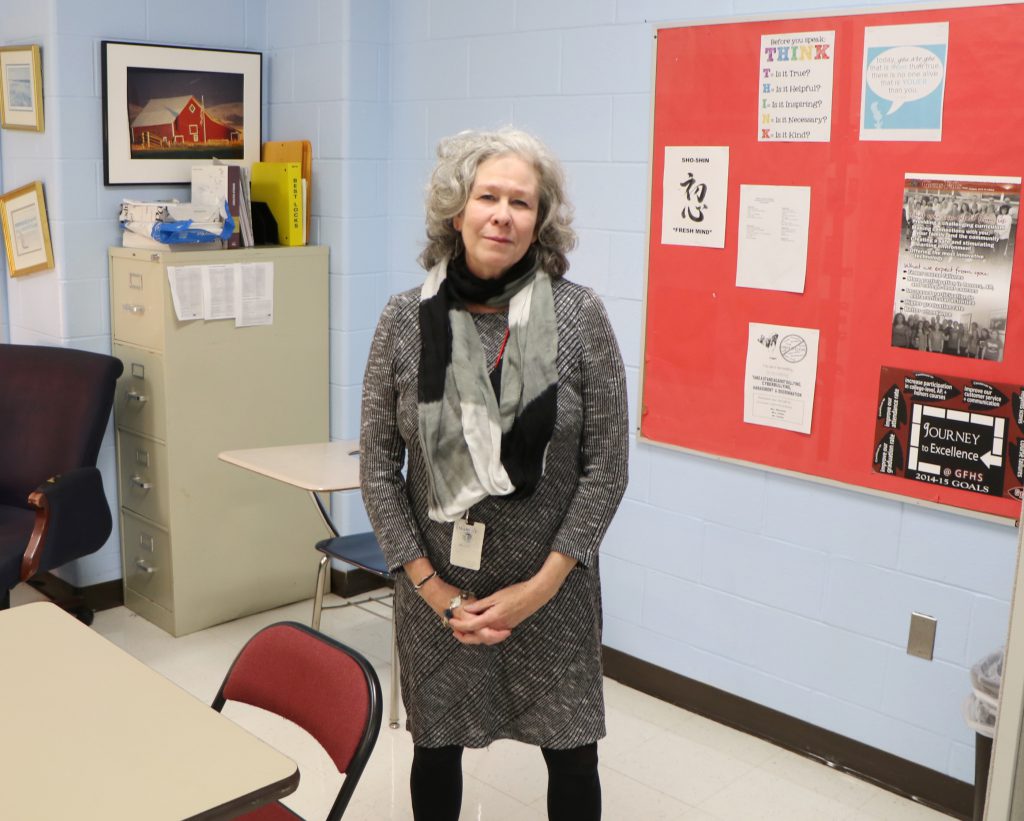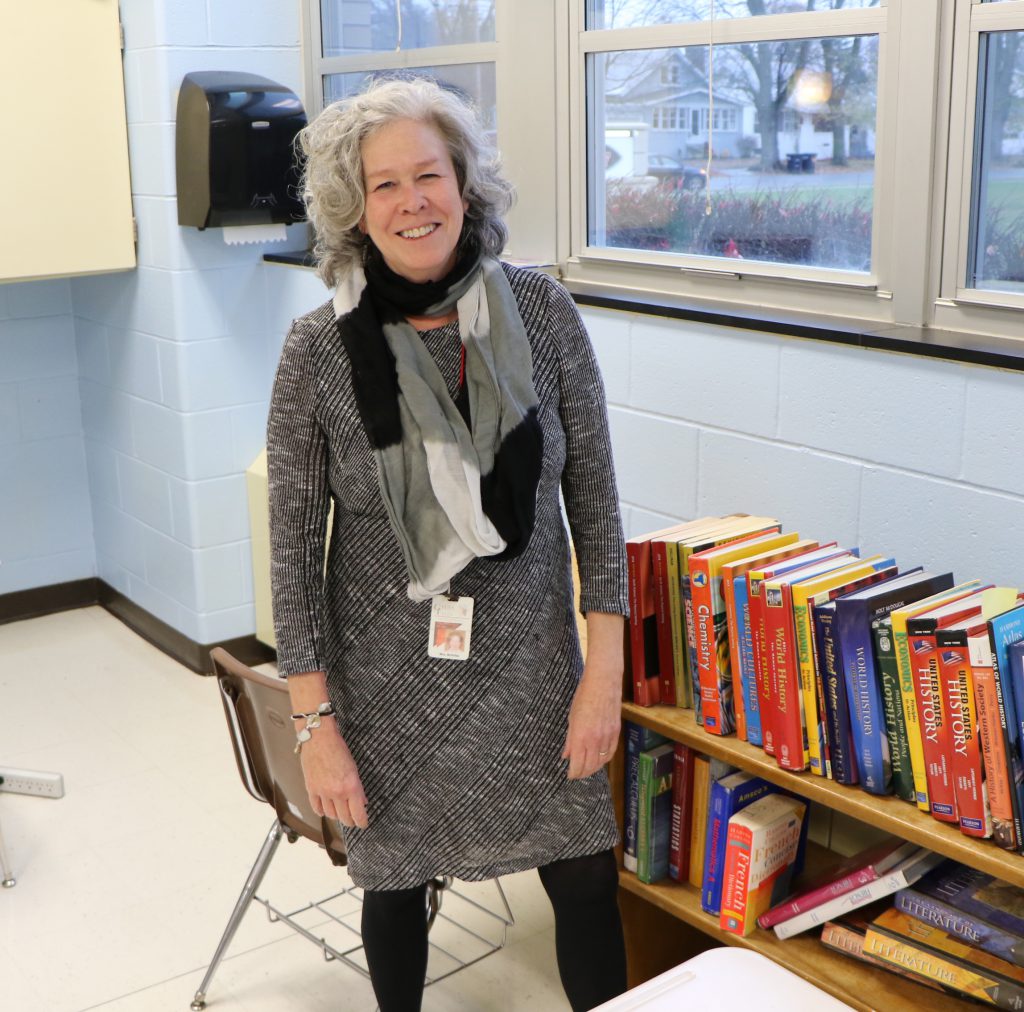 Down a quiet high school hallway is a partitioned, naturally-lit classroom painted with sky-blue walls called the Alternative Learning Area.
Down a quiet high school hallway is a partitioned, naturally-lit classroom painted with sky-blue walls called the Alternative Learning Area.
“The ALA room is multi-functional,” explains Teaching Assistant Kate McKillip, who works with students in ALA. “A student may be here for a disciplinary reason for a full day (such as an in-school suspension), or if they have been sent from a class until the end of that period, or a non-disciplinary reason: making up work because they’ve been out, needing a quiet place due to a concussion or having a bad day, doing sportsfolios when injured and unable to attend PE… there are lots of reasons.”
Ms. McKillip oversees the ALA room, which includes SASS (Student Academic Support Services) tutoring, and detention after school. Principal Tammy Silvernell says Ms. McKillip’s approach to students is respectful and caring. “She goes the extra mile and has good relationships with students,” Mrs. Silvernell says. “Her caring demeanor and helpful disposition is a benefit to all the students she serves.”
She spends her day multi-tasking to meet the unique needs of each student in ALA. She describes it as “trying to find a way to keep those who are unhappy with a disciplinary consequence on task and undisruptive, helping students who need it with their work and organizing themselves, keeping track of SASS students as they come and go, and still trying to get to know students on a more personal level—encouraging them to be here and to care about their education for their own sake.”
Between working with students, she updates the detention list, sends out detention reminders to students, generates attendance letters for tardies and absences, and enters tardies into discipline.
 She has a straightforward approach to managing the ALA room. “If you are here for a disciplinary reason, there is ‘no phone, no music, no fun,’” Ms. McKillip says. “You have to be escorted everywhere you go and I expect you to work throughout the day, or at least read, or do a sudoku. I tell students I want it to be the most boring day of their life (so they don’t want to come back) but also the most productive day of their life so when they get back to class, it is as if they lost no time. I am in communication with their teachers throughout the day and often it is a chance to make up back work if they are behind. The occasional student has to be reminded not to get in trouble on purpose, but to ask an administrator or a counselor for permission to access SASS for the day if they are behind and feeling overwhelmed by work.”
She has a straightforward approach to managing the ALA room. “If you are here for a disciplinary reason, there is ‘no phone, no music, no fun,’” Ms. McKillip says. “You have to be escorted everywhere you go and I expect you to work throughout the day, or at least read, or do a sudoku. I tell students I want it to be the most boring day of their life (so they don’t want to come back) but also the most productive day of their life so when they get back to class, it is as if they lost no time. I am in communication with their teachers throughout the day and often it is a chance to make up back work if they are behind. The occasional student has to be reminded not to get in trouble on purpose, but to ask an administrator or a counselor for permission to access SASS for the day if they are behind and feeling overwhelmed by work.”
“Students who are here for non-disciplinary reasons may listen to music,” she continues. “Depending on their circumstances, I try to help them do as much work as they can, or just get them to the point where they feel they can go back to class. I communicate with their teachers or service providers throughout the time they are here.”
As much as possible, Ms. McKillip tries to make time spent in the ALA room productive, printing out assignment reports for students and helping them make an action plan to attack it. “Even if someone is here for a disciplinary reason, I try to hear them as people and help them to connect better with their teachers and their work,” she notes.
“The most rewarding thing is when a student with terrible attendance begins to show up more regularly,” says Ms. McKillip. “When a student who was terribly behind gets caught up and feels good about themselves, when a student who has graduated comes back to say hello (even if most of the time they had spent with me when they were here was because they were in trouble or having a rotten time), or when someone comes by to say ‘Hi’ because they AREN’T spending so much time with me any more,” she continues.
Ms. McKillip is beginning her 22nd year at GFSD, having worked at all the schools in the district, “though at Sanford as a volunteer and PTA member, rather than staff,” she notes. She began working with the Special Education department in 2001 and has worked for the Summer Program as well as during the year. This is the sixth year she has served students in the Alternative Learning Area.
She has a Masters in Fine Arts from New York University’s Tisch School of the Arts, and a B.A. from The State University of Iowa, after having grown up in Chicago Heights, Illinois. She serves on the Board of the Feeder Canal Alliance, helping to maintain the historical canal and bike/walking trail and promote awareness of the history of this resource through the field school established at the Coal Silos on the Canal in Hudson Falls. When not at work, she enjoys reading, walking, and going to the theatre and hockey games.
